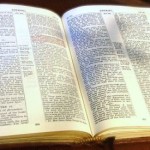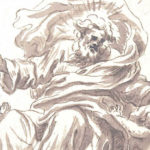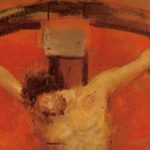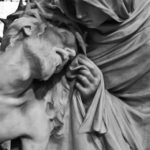We run our website the way we wished the whole internet worked: we provide high quality original content with no ads. We are funded solely by your direct support. Please consider supporting this project.

Classical Theism’s Unnecessary Paradoxes
The traditional view of God that is embraced by most—what is called “classical theology”—works from the assumption that God’s essential divine nature is atemporal, immutable, and impassible. The Church Fathers fought to articulate and defend the absolute distinction between the Creator and creation and they did this—in a variety of ways—by defining God’s eternal nature over-and-against the creation. Thus they embraced a conception of God’s being in his transcendent nature that contrasted with God’s accommodating activity with his people. God’s essential eternal nature was defined over-and-against God’s ultimate accommodation in the Incarnation and Crucifixion of Christ.
This view of God generated many impenetrable Christological conundrums. How, for example, does the God who is “above” change nevertheless become a human? How does the God who is “above” suffering nevertheless suffer on Calvary? How does the God who is “above” time nevertheless enter human history at a particular point in time? And how can the God who is “above” being affected by anything outside of God’s self nevertheless get crucified by humans? This “over-and-against” quality of God in the classical tradition is most clearly seen in the fact that classical theologians generally decided that the changeability, passions, and suffering of the Son of God must be ascribed to his humanity but not unambiguously to his divinity.
Defenders of the classical tradition tend to interpret the paradoxical language that permeates classical theology as reflecting the classical conviction that we are dealing with a God who is “wholly other” and who thus transcends the categories of our thought and speech. Critics of this tradition, on the other hand, argue that these “paradoxes” are actually contradictions that reflect incoherent perspectives that the Gospel now needs to be delivered from. While I clearly side with the latter group, the more fundamental point is that these paradoxes (or contradictions) only arise because classical theologians attempted to understand the Incarnation and Crucifixion in light of a presupposed understanding of God’s transcendence rather than the other way around.
If, for the sake of argument, we accept the coherence of the claim that a God who is altogether atemporal, immutable, and impassible can in some sense become a human and suffer on the cross, the paradox of this claim only arises because classical theologians assumed that God was altogether atemporal, immutable, and impassible before they reflected on how he could nevertheless suffer as a human in Christ. This “nevertheless” reflects the fact that the God who suffered as a man is a problem to be solved—or a paradox that must be accepted—only because these theologians are reflecting on the cross with a presupposed concept of God’s eternal nature that is defined over-and-against it rather than starting with the cross to derive their concept of God’s eternal nature from it.
Had the early Church Fathers instead started with the crucified God as the definitive and complete revelation of God, they would never have had occasion to suspect there was any problem ascribing suffering to God. To the contrary, had they started with the cross and oriented all their reflections around the cross, the first thing they would have concluded about God is that God obviously can and does suffer. Had they started and oriented all their thinking around the cross, they would not only have accepted that the suffering of Christ is compatible with God’s essential nature, they would have accepted from the start that the suffering of Christ is the definitive revelation of God’s essential nature. So too, had they started with the cross rather than with a philosophical conception of God’s transcendence that is defined over-and-against creation, I submit that they never would have felt an inclination, let alone any need, to ascribe Christ’s suffering to his humanity but not unambiguously to his divinity.
Along the same lines, had the early fathers oriented all their thinking about God from start to finish around the One who became incarnate and who was crucified, I submit that they never would have felt any need to give an account of paradoxes such as how a God who is essentially atemporal can nevertheless enter time or how a God whose essence is altogether immutable can nevertheless change and become a human. If we orient all our thinking around Christ, this “nevertheless” simply does not arise. To the contrary, with a Christocentric and cruciform orientation, the fact that God became a human and suffered on the cross reveals that God’s essential being includes temporality, changeability, and a capacity to suffer. Indeed, while the classical tradition must struggle to show how these qualities are paradoxically compatible with God’s perfection, if we orient all our thinking around the crucified Christ, these qualities become the hallmark and definitive expression of God’s perfection.
Photo credit: giovanni_novara via VisualHunt / CC BY-NC-SA
Category: General
Tags: Attributes of God, Classical Theism, Cruciform Theology, Jesus, Suffering
Topics: Attributes and Character
Related Reading

Answering an Objection to a Cross-Centered Approach to Scripture
Through Greg’s Facebook and Twitter, we’ve been getting some great feedback and questions regarding his cross-centered approach to Scripture. Several have voiced questions similar to the reader’s (below), so we thought it would be helpful to post Greg’s answer here on his blog.

Podcast: Isn’t God Withdrawing the SAME as Him Personally Punishing and Causing Violence?
Greg discusses whether the passivity of withdrawal is distinguishable from active punishment. http://traffic.libsyn.com/askgregboyd/Episode_0186.mp3

Why Did Jesus Die on the Cross?
If asked why Jesus had to die on the cross, most Christians today would immediately answer, “To pay for my sins.” Jesus certainly paid the price for our sins, but it might surprise some reader to learn that this wasn’t the way Christians would answer this question for the first thousand years of Church history.…

Final Thoughts on Copan’s Critique of Crucifixion of the Warrior God
I want to sincerely thank Paul Copan for his well-researched critique of Crucifixion of the Warrior God (CWG) that I’ve been responding to over the last several weeks. He exposed areas in my work that needed buttressing up and/or clarifying, and he has helped introduce my ideas into the theological and philosophical marketplace of concepts…

Lighten Up: The Jesus Eraser
“For he himself is our peace, who has made the two groups one and has destroyed the barrier, the dividing wall of hostility…” Ephesians 2:14 Image by David Hayward @ www.nakedpastor.com.

Finding an Alternative Jesus
The “Newly Discovered” Jesus One of the most common, and most disturbing, refrains heard in the media’s coverage of contemporary radical views of Christ is that New Testament scholars have recently “discovered” new sources of information about Jesus that contradict the Bible’s own view of Jesus. It is claimed that works such as the Gospel…
